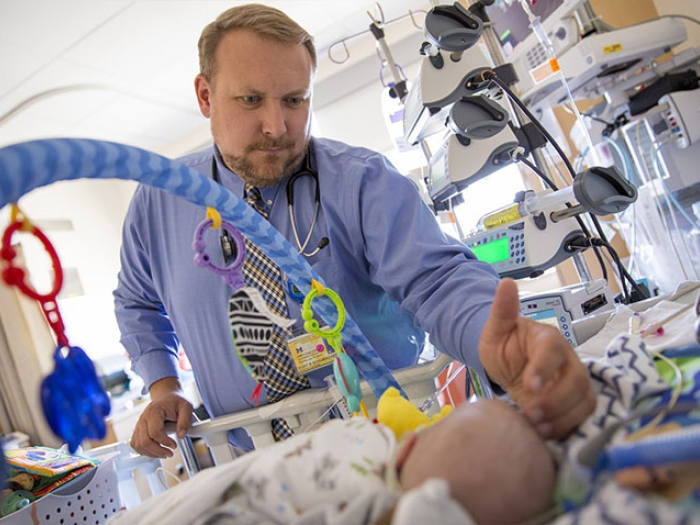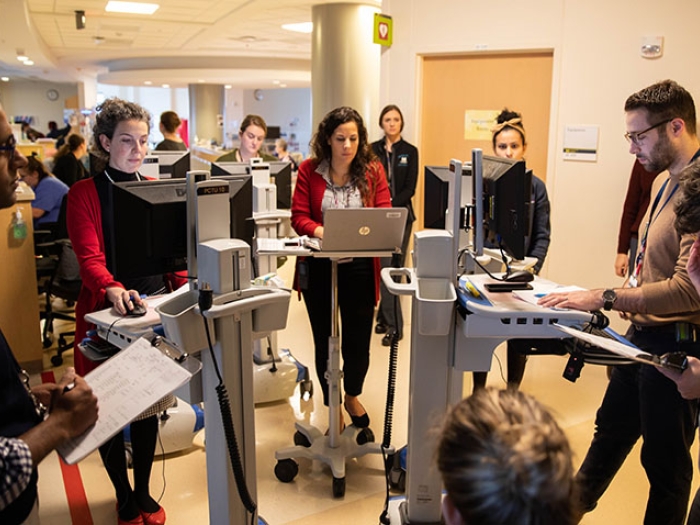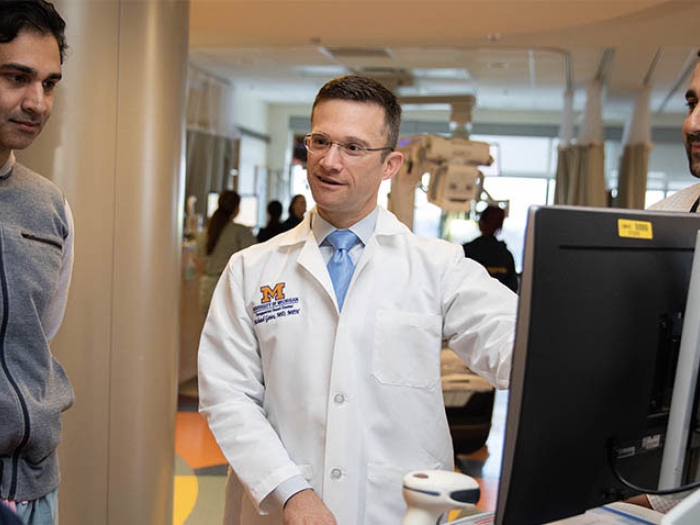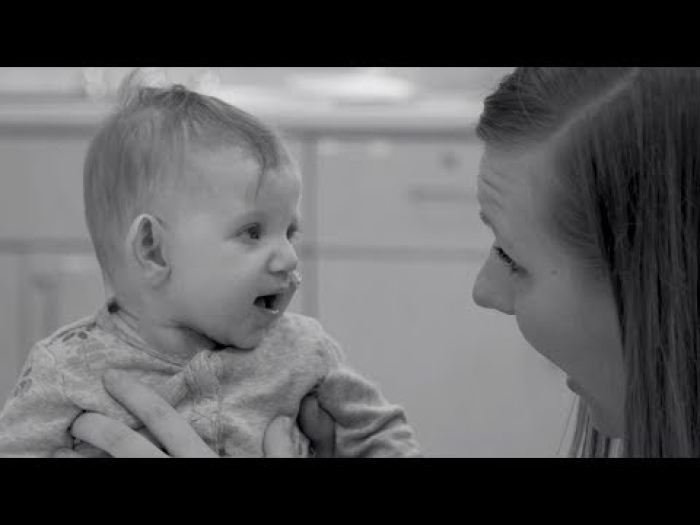New and developing data sheds light on survival, risks and outcomes associated with surgery for congenitally corrected transposition of the great arteries in kids.
5:00 AM
Author |

In rare instances during fetal life, a baby's heart develops abnormally and results in a reversal of both ventricles and major blood vessels leading away from the heart.
The "two wrongs" in this case can make a right, at least for a period of time, as blood still flows to the correct location, which is why this heart defect is known as congenitally "corrected" transposition of the great arteries (CCTGA). However, over the long run, the right ventricle may not be able to keep up with the demand of pumping blood to the body, normally a task for the stronger left ventricle.
LISTEN UP: Add the new Michigan Medicine News Break to your Alexa-enabled device, or subscribe to our daily updates on iTunes, Google Play and Stitcher.
To prevent the risk of heart failure, children with CCTGA can undergo a complex type of surgery known as a double-switch operation. These procedures involve essentially rebuilding the heart and redirecting blood flow from one side to the other so that the more robust left ventricle pumps to the body and the right ventricle pumps blood to the lungs, as they were meant to do.
The major arteries, which were initially reversed during heart development, also need to be switched during the surgery.
But little data is available on long term outcomes for children who undergo this very complex cardiac surgery for CCTGA. The heart defect is relatively rare and few heart centers have expertise in performing this type of complex operation.
Now, multiple studies from Michigan Medicine C.S. Mott Children's Hospital, which has one of the highest volumes of these procedures in the country, seek to better understand outcomes in this population of children years after surgery.
Researchers from the Congenital Heart Center at Mott presented early findings from studies on survival, heart function, quality of life and the risk of arrhythmias for children who undergo anatomic repair for CCTGA at the virtual American Heart Association scientific sessions.
"We believe that surgery can be done safely and lead to positive outcomes for children with corrected transposition of the great arteries, but we want to better understand the long-term results," says Mott pediatric cardiologist and one of the senior authors Caren Goldberg, M.D. M.S., professor of pediatrics and director of the Michigan Congenital Heart Outcomes Research and Discovery Program.
"Supported by the unique research program within the Congenital Heart Center, our investigators collaborated to efficiently collect data and answer a range of questions about important outcomes in our study cohort."
Understanding early and late surgical outcomes is crucial for counseling patients and families.Caren Goldberg, M.D. M.S.
The studies evaluated children who underwent two related types of surgeries known as the Senning-arterial switch operation and Senning-Rastelli procedure. Doctors determined the best procedure for each patient depending on their heart's unique anatomy and the presence of cardiac defects in addition to CCTGA.
Like Podcasts? Add the Michigan Medicine News Break on iTunes or anywhere you listen to podcasts.
The detailed planning and comprehensive care for these patients involves collaboration across surgeons and cardiologists within the heart center's Complex Biventricular Repair Program. Children are referred from around the country to receive care through this innovative program.
"Michigan Medicine has one of the largest experiences with complex surgeries for CCTGA," Goldberg says. "This puts us in the best position to study important outcomes so we can improve care and better serve our patients.
"Understanding early and late surgical outcomes is crucial for counseling patients and families," she adds.
Findings from the four studies related to surgery outcomes for congenitally corrected transposition of the great arteries that were shared at the November 2020 AHA sessions include:
Survival and complications after surgery
While surgery to restore the left ventricle as the body's primary pumping chamber has long term functional benefits for patients, it also comes with short-term risks.
Researchers wanted to better understand these risks by evaluating outcomes in 118 patients who underwent surgery from 1993-2018. In-hospital mortality and morbidity were compared between the most recent period (2010-2018) and past surgical eras.
Survival was 85%, 82%, and 70% at one, 10, and 20 years after repair, respectively. At a follow up nine years after surgery, less than half of the patients required surgical or catheter-based re-intervention.
"Our teams looked at short and long-term survival, major complications, and freedom from re-intervention," says senior author Michael Gaies M.D., pediatric cardiac intensivist at Mott and co-director of quality within the Congenital Heart Center.
Patients who went into surgery with multiple heart defects and other organ abnormalities or dysfunction in their right ventricle had a higher risk of mortality.
Survival was significantly lower in the group of patients who received the Senning-Rastelli procedure compared to the Senning-arterial switch operation. For the most recent era, 30 of 32 patients (94%) with the Senning-arterial switch operation and 19 of 22 patients (86%) with Senning-Rastelli procedure survived to hospital discharge.
MORE FROM THE LAB: Subscribe to our weekly newsletter
"The specific type of procedure patients receive is determined by their heart's anatomy and co-existing heart defects," Gaies says. "We found that mortality remains high following Senning-Rastelli operations, which are performed on the most complex hearts. This reinforces the importance of carefully selecting patients for these procedures and counseling families about risk."
The study's lead author is Kimberly Watkins, M.D., former Mott pediatric cardiology fellow and currently with the Children's Heart Clinic, Children's Minnesota.
One of the concerns about babies who undergo surgery for CCTGA is that they may later experience an abnormal heart rhythm, or arrhythmia. Some heart arrhythmias can be serious or even life threatening.
Researchers tracked 85 patients who had complex heart surgery for CCTGA between 1993 and 2017. The average age of surgery was 1.5 years.
By 10 years of follow up, more than half of patients had developed an arrhythmia requiring intervention with a higher risk of atrial arrhythmias but lower risk of ventricular arrhythmias and sudden cardiac death.
The risk of naturally developing heart block was similar to children with CCTGA who did not undergo this repair; though there was a greater need for pacemakers due to both post-surgical heart block and sinus node dysfunction.
The study was led by Mott pediatric cardiology fellow Rebecca Hartog, M.D., and Mott pediatric electrophysiologist Martin J. LaPage. M.D., M.S.
Research teams also wanted to better understand quality of life following surgery children with CCTGA.
They evaluated responses from 56 families who participated in surveys measuring physical and psychosocial skills, including motor, communication and adaptive skills.
Quality of life reported by patients or by parents was consistent with quality of life reported for other complex congenital heat abnormalities. Those with longer hospitalizations, surgical or catheter-based re-intervention following hospital discharge and heart failure symptoms were more likely to have lower quality of life scores.
"During our follow up care with children who have had complex cardiac surgery we need to be evaluating more than the health of their heart," says Goldberg, senior author on the study. "We know these children are at higher risk of neurodevelopmental delays and other issues that impact quality of life, and we need to be closely monitoring and identifying these issues as early as possible."
Mott pediatric cardiology fellow Tiffany Lim, M.D., was the study's lead author.
Predicting ventricular dysfunction
When surgeons repair congenitally corrected transposition of the great arteries, they re-establish the left ventricle as the ventricle that pumps blood to the body.
This is why any dysfunction in the left ventricle is an important factor in long-term patient health. But there are little data on how the left ventricle functions before and after the surgery and risk factors for poor function.
Michigan researchers evaluated pre-operative and discharge echocardiograms in 91 patients with CCTGA after repair from 2000-2018.
They found that children had a mild decline in ventricular function but within a normal range at discharge. Further research is needed to evaluate how ventricular function may change over the long-term.
"It's not unusual to see ventricular function dip a bit in the immediate post-operative period, and that may improve over time," Goldberg says.
"Follow up to these initial echocardiograms further out from surgery will help us better understand the long term impact on ventricular function."
The study was led by Mott pediatric fellow Megan Wilde, M.D., and senior author Adam Dorfman, M.D., Mott pediatric cardiologist and director of non-invasive imaging within the heart center.

Explore a variety of healthcare news & stories by visiting the Health Lab home page for more articles.

Department of Communication at Michigan Medicine
Want top health & research news weekly? Sign up for Health Lab’s newsletters today!





